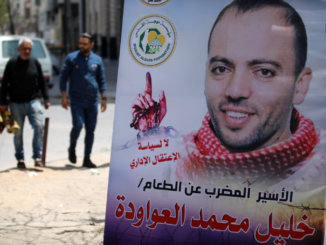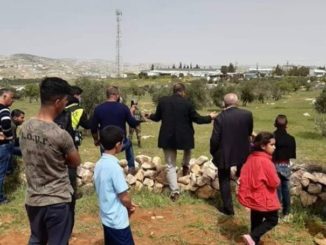
By Ramona Wadi
This year marks the 30th anniversary of the signing of the UN Convention on the Rights of the Child. True to form, UN, EU and Palestinian Authority representatives abandoned their political roles to pose as pseudo-activists for a month, embarking upon the Masar Ibrahim Al Khalil trail walk in the occupied West Bank, accompanied by Palestinian children, to “raise awareness” and highlight different articles of the convention along the route.
Jamie McGoldrick, Humanitarian Coordinator for the Occupied Palestinian Territory, hopes “that the walks undertaken over these last 30 days further focus attention on how to safeguard and promote children’s rights in the very unique and challenging context of Palestine.”
Aside from the platitudes which the participating representatives reserved for themselves, it is unlikely that the trekking venture has contributed to one single change in the lives of Palestinian children. Nevertheless, we are told that the children expressed “how happy they are to have their rights promoted and respected.”
Promoting samples of text from the convention is not equivalent to promoting the rights of Palestinian children. Quoting what children allegedly said to the representatives is not even indicative of the reality that Palestinian children face daily as a result of Israel’s colonial violence. But why ruin a large-scale propaganda exercise by mentioning the actual reasons why Palestinians have no apparent “right to an equal chance to reach their innate potential, irrespective of background of circumstance”?
The trail walk made no difference to UN, EU and PA rhetoric; these generic statements could have been uttered from the usual podiums. All the representatives know full well that background, context and circumstance make all the difference when it comes to the illusion of equal opportunities.
As detached from reality as politicians are, including those masquerading as purported activists for a brief period, there was no mention of how the UN conventions employ generalized rhetoric and fail to address the specifics of political violations. To ensure that the trail walk’s “awareness” was rendered completely void of significance, the representatives omitted any reference to Israel, preferring the euphemism of “the continuing conflict” instead.
As politicians, all representatives have the duty to implement the changes which would enable the rights of Palestinian children to become a tangible means for achievement. The EU, UN, and PA can and should prioritize decolonization as the first step; after all, is the UN not supposed to be committed to eliminating colonialism? Instead, the collective antics of these institutional representatives have ensured the protection of Israel’s colonial violence against Palestinian children, while their lack of rights is framed against “obstacles resulting from a combination of factors”.
Raising awareness is an exercise performed with the intent to change existing injustice. These politicians — let’s call them performers, shall we? — have every intention to ensure the opposite. Trail walks and a month of sightseeing in occupied Palestine at the expense of children’s rights is an abomination, regardless of the EU’s funding of the trail to “enhance Palestinian citizenship and identity”.
If Israel is constantly erasing Palestine and Palestinians, as the UN, EU and the PA are well aware, how does a walk to promote the convention alter the ramifications of Israeli colonialism, backed as it is by the same entities which put themselves and human rights rhetoric on an untouchable pedestal?
– Ramona Wadi is a staff writer for Middle East Monitor, where this article was originally published. She contributed this article to the Palestine Chronicle.







